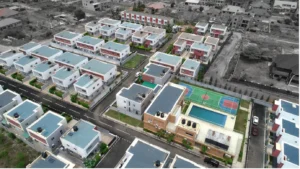The Ghanaian real estate market is a dynamic and evolving landscape, offering a wealth of opportunities for both local and international buyers. Whether you’re looking to invest, purchase a home, or simply understand the market better, staying informed about current trends and insights is crucial. In this article, we’ll delve into the key factors shaping the Ghanaian real estate market, providing expert opinions and data to help you make informed decisions.
Overview of the Ghanaian Real Estate Market
Ghana’s real estate market has seen substantial growth over the past decade, driven by urbanization, economic development, and increasing foreign investment. Major cities like Accra, Tema, and Kumasi have become hotspots for residential and commercial developments, attracting a diverse range of investors and homebuyers.
This growth has led to a diverse market, where you can find everything from affordable housing projects to luxury estates. However, navigating this market requires an understanding of the factors that influence property values, demand, and future trends.
Key Trends in the Ghanaian Real Estate Market
1. Urbanization and Increased Demand for Housing
Ghana’s rapid urbanization has led to a significant increase in demand for housing, particularly in cities like Accra and Tema. As more people migrate to urban areas for job opportunities, the need for residential properties continues to rise. This has resulted in higher property prices, especially in prime locations.
Data Insight:
According to recent data, Accra remains the most expensive city in Ghana for real estate, with average property prices significantly higher than in other regions. Tema, known for its planned communities and industrial hubs, is also seeing rising property values as demand increases.
2. The Rise of Gated Communities
Gated communities have become increasingly popular in Ghana, particularly among middle and upper-class buyers. These developments offer a range of amenities such as security, recreational facilities, and communal areas, making them attractive to families and expatriates.
Expert Opinion:
“Gated communities in Ghana provide not only security but also a sense of community and access to modern amenities,” says Kwame Osei, a real estate developer in Accra. “As urban living becomes more hectic, the demand for these self-contained communities is expected to grow.”
3. Growing Interest in Eco-Friendly and Sustainable Homes
As environmental awareness increases, more homebuyers in Ghana are seeking eco-friendly and sustainable housing options. Developers are responding by incorporating green building practices, energy-efficient designs, and sustainable materials into new projects.
Data Insight:
A recent survey revealed that 60% of potential homebuyers in Ghana are willing to pay a premium for properties that offer energy efficiency and sustainable features, highlighting a significant shift in consumer preferences.
4. Infrastructure Development and Its Impact on Real Estate
Infrastructure development plays a critical role in shaping the real estate market in Ghana. Ongoing projects such as new roads, bridges, and public transport systems are making previously less accessible areas more attractive to buyers. As a result, property values in these areas are rising.
Expert Opinion:
“Investing in areas with planned infrastructure improvements is a smart move,” advises Nana Mensah, a property consultant based in Tema. “As these areas develop, property values are likely to increase, offering good returns for investors.”
5. The Influence of Foreign Investment
Foreign investment continues to be a driving force in the Ghanaian real estate market. Investors from Europe, the Middle East, and the United States are drawn to Ghana due to its stable political climate, growing economy, and strategic location in West Africa.
Data Insight:
Foreign investors accounted for nearly 30% of high-end property purchases in Accra in the past year, indicating strong international interest in the market. This influx of foreign capital is contributing to the development of luxury properties and commercial real estate.
Challenges in the Ghanaian Real Estate Market
While the Ghanaian real estate market offers numerous opportunities, it also presents certain challenges that buyers and investors should be aware of:
1. Land Ownership Issues
Land ownership in Ghana can be complex, with multiple parties often claiming rights to the same piece of land. It is essential for buyers to conduct thorough due diligence and work with experienced real estate agents or legal professionals to avoid disputes.
2. High Property Prices
In major cities, property prices can be prohibitively high for many potential buyers. This has led to a growing demand for affordable housing solutions, particularly in urban areas where young professionals and middle-income earners are looking to purchase their first homes.
3. Regulatory Challenges
Navigating the regulatory landscape in Ghana can be challenging, especially for foreign investors. Understanding local property laws, zoning regulations, and tax implications is crucial to ensuring a smooth transaction.
Tips for Buyers and Investors
To successfully navigate the Ghanaian real estate market, consider the following tips:
1. Work with Reputable Agents
Partnering with a reputable real estate agent who understands the local market is invaluable. They can provide insights, negotiate on your behalf, and help you avoid potential pitfalls.
2. Conduct Thorough Due Diligence
Before purchasing property, ensure that all necessary checks are carried out, including verifying land ownership, understanding the legal framework, and assessing the property’s value.
3. Consider Future Development Plans
Investing in areas with planned infrastructure or development projects can yield higher returns. Research upcoming projects in the area to make an informed decision.
4. Be Aware of Market Trends
Stay informed about the latest market trends, including changes in property prices, demand, and consumer preferences. This knowledge will help you make strategic investment decisions.
Navigating the Ghanaian Real Estate Market with Confidence
The Ghanaian real estate market is full of opportunities, but understanding the trends, challenges, and factors that influence it is key to making informed decisions. Whether you’re a first-time homebuyer or a seasoned investor, staying informed and working with experienced professionals will help you navigate the market with confidence.
Ready to explore the Ghanaian real estate market? Share your thoughts and experiences in the comments below. For more expert insights and the latest trends, visit The Greens Estate Blog. Let us guide you on your journey to finding the perfect property in Ghana!


